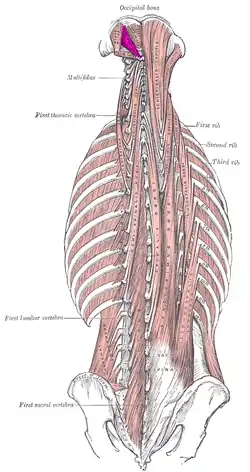Rectus capitis posterior major muscle
The rectus capitis posterior major (or rectus capitis posticus major, both being Latin for larger posterior straight muscle of the head) arises by a pointed tendon from the spinous process of the axis, and, becoming broader as it ascends, is inserted into the lateral part of the inferior nuchal line of the occipital bone and the surface of the bone immediately below the line.
| Rectus capitis posterior major muscle | |
|---|---|
 Deep muscles of the back. (Rect. post. major visible at upper left.) | |
| Details | |
| Origin | Spinous process of the axis (C2) |
| Insertion | Inferior nuchal line of the occipital bone |
| Artery | Occipital Artery |
| Nerve | Dorsal ramus of C1 (suboccipital nerve), sub-occipital nerve |
| Actions | Ipsilateral rotation of head and extension |
| Identifiers | |
| Latin | Musculus rectus capitis posterior major |
| TA98 | A04.2.02.004 |
| TA2 | 2249 |
| FMA | 32525 |
| Anatomical terms of muscle | |
A soft tissue connection bridging from the rectus capitis posterior major to the cervical dura mater was described in 2011. Various clinical manifestations may be linked to this anatomical relationship.[1] It has also been postulated that this connection serves as a monitor of dural tension along with the rectus capitis posterior minor and the obliquus capitis inferior.
As the muscles of the two sides pass upward and lateralward, they leave between them a triangular space, in which the rectus capitis posterior minor is seen.
Its main actions are to extend and rotate the atlanto-occipital joint.
See also
Additional images
 Position of rectus capitis posterior major muscle (shown in red).
Position of rectus capitis posterior major muscle (shown in red). Rectus capitis posterior major muscle.
Rectus capitis posterior major muscle. Occipital bone. Outer surface.
Occipital bone. Outer surface. Rectus capitis posterior major's relationship to other suboccipital muscles.
Rectus capitis posterior major's relationship to other suboccipital muscles.
References
This article incorporates text in the public domain from page 401 of the 20th edition of Gray's Anatomy (1918)
- Frank Scali; Eric S. Marsili; Matt E. Pontell (2011). "Anatomical Connection Between the Rectus Capitis Posterior Major and the Dura Mater". Spine. 36 (25): E1612–4. doi:10.1097/BRS.0b013e31821129df. PMID 21278628.
External links
| Wikimedia Commons has media related to Rectus capitis posterior major muscles. |
- PTCentral
- Anatomy photo:01:10-0102 at the SUNY Downstate Medical Center
- Anatomy figure: 01:07-04 at Human Anatomy Online, SUNY Downstate Medical Center